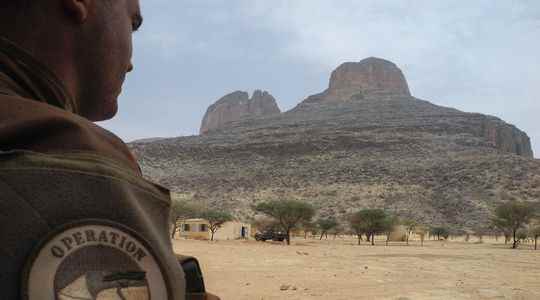Until the last minute, Emmanuel Macron made the suspense last. Going or staying in Mali? The choice was, to tell the truth, no longer so much in doubt, given the deterioration of relations with the junta in power in Bamako. But officially, nothing was decided on February 16, before dinner at the Elysée in the presence of twenty European and African representatives. The watchword of Paris: “Con-cer-ta-tion”.
Promised, sworn, France does not decide alone. The protocol had provided for four desks to announce the “coordinated withdrawal” of Barkhane in Mali within six months, after nine years of intervention with mixed results. Alongside Emmanuel Macron, the Heads of State of Senegal and Ghana, respectively at the head of the African Union and the Economic Community of West African States, and the President of the European Council.
Because the Elysée hammers it: the “stabilization” of the Sahel is the business of the whole Old Continent. It would still be necessary for the Twenty-Seven to agree on the way forward. “There are clear divisions between member states on the nature of engagement in the Sahel, notes Volker Hauck, researcher at the think tank European Center for Development Policy Management, based in the Netherlands. The big elephant in the room, c is the difference between France and Germany.”
“In Germany, it is the deputies who decide, it is a completely different model from that of France”, slice a high-ranking French. But that’s not all. In Berlin, we have been criticizing for years the overly secure approach of the neighbor across the Rhine. So when the idea of an alliance of European special forces emerged in Paris two years ago, the Germans passed their turn.
“France has done a huge lobbying”
Regardless, Operation Takuba was made official in March 2020. The announcement came at a good time, ten months before a French presidency of the European Union placed under the sign of “Europe power”. “It is a laboratory in terms of European defence, welcomed a French colonel a few weeks ago. We have a coalition of volunteers who believe that the security of Europe is at stake in the Sahel. This strategic solidarity is a major turning point.”
But convincing the States was not an easy task. “France lobbied enormously,” says Andrew Lebovich, a researcher at the European Council on External Relations. Estonia, among the first to respond, surprises. Some see it as a thank you for the French unit deployed on its territory within the framework of NATO. “Of course, we help each other,” admits a soldier. For other armies that have just returned from the war in Afghanistan, Takuba offers an opportunity to keep their special forces up to date. A dozen countries finally join.
But the affair is cut short at the end of January, when Bamako, in the middle of a quarrel with France, summons the Danish contingent of Takuba to leave Mali immediately, on the grounds that the authorities have not given their agreement to this deployment. . The episode, followed by the expulsion of the French ambassador to Bamako, hastened Barkhane’s exit. And the dissolution, in fact, of Takuba. But Emmanuel Macron assures us: as part of the new security system in the Sahel, Europeans will be “repositioned” in Niger. How many countries will participate? Hard to know. Above all, these States will again have to present their draft commitment to their national parliaments for approval.
Beyond this task force, the Twenty-Seven are still far from speaking with one voice in the Sahel. Spain and Germany, both very involved in the European training mission of the Malian army (EUTM) and in the UN peacekeeping operation, plead rather, behind the scenes, for the maintenance of this presence.
“Spain only looks at Mali from the migratory angle”, mocks a French diplomat. “As for Germany, it has every intention of keeping its free will and sees the risk of losing its reputation by being too close to the French,” said analyst Volker Hauck. But the hardline attitude of the Malian junta, which announced on February 18 that Barkhane would not be given any time to leave, could end up creating a sacred union in Brussels.
